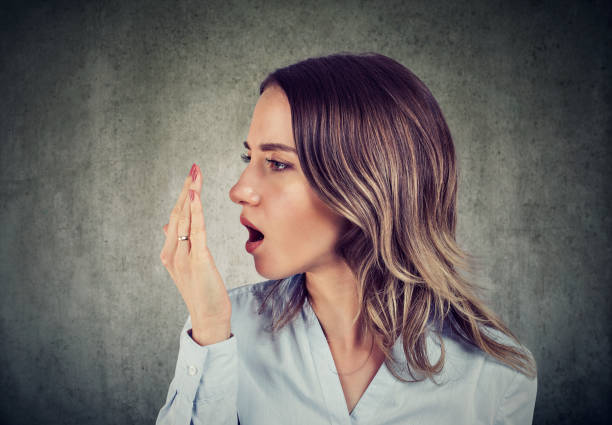What is Halitosis?
Halitosis, also known as bad breath, is a condition in which a person's breath has an unpleasant odor. The most common cause of halitosis is poor oral hygiene. When food particles and bacteria are allowed to accumulate in the mouth, they can cause a bad smell. Other causes of halitosis include:
Dry mouth: Saliva helps to rinse away food particles and bacteria, so a lack of saliva can lead to bad breath.
Tobacco use: Smoking or chewing tobacco can cause bad breath.
Certain foods and drinks: Some foods, such as garlic and onions, can cause bad breath because they contain compounds that are absorbed into the bloodstream and exhaled through the lungs. Alcohol and coffee can also contribute to bad breath.
Medical conditions: Certain medical conditions, such as sinus infections, bronchitis, and diabetes, can cause bad breath.
Certain medications: Some medications, such as certain types of antidepressants and high blood pressure medications, can cause dry mouth and lead to bad breath.
If you are concerned about bad breath, it is a good idea to practice good oral hygiene, drink plenty of water, and avoid tobacco and certain foods and drinks.
Discuss the symptoms and effects of halitosis.
The primary symptom of halitosis is bad breath, which can have a number of effects on a person's life. Some people with halitosis may experience embarrassment or social discomfort, as they may feel self-conscious about their breath. They may also have difficulty maintaining close relationships, as the smell of their breath may be off-putting to others. In severe cases, halitosis may cause a person to avoid social situations altogether.
In addition to the social effects of halitosis, the condition can also have an impact on a person's oral health. If bad breath is caused by poor oral hygiene, it may be a sign of underlying problems such as gum disease or tooth decay. These conditions can lead to further health problems if left untreated.
It is important to address the symptoms of halitosis and seek treatment if necessary. Good oral hygiene, including brushing and flossing regularly, can help to prevent bad breath.
Discuss the treatments for halitosis.
The treatment for halitosis will depend on the underlying cause of the condition. Some common treatments for halitosis include:
Improving oral hygiene: The most common cause of halitosis is poor oral hygiene. Brushing and flossing regularly, as well as using mouthwash, can help to remove food particles and bacteria that may be causing bad breath.
Treating underlying medical conditions: If halitosis is caused by a medical condition, such as a sinus infection or bronchitis, treating the underlying condition may help to improve bad breath.
Using saliva substitutes: Dry mouth can lead to bad breath. Using saliva substitutes, such as mouth sprays or gels, can help to keep the mouth moist and prevent bad breath.
Quitting tobacco use: Smoking or chewing tobacco can cause bad breath. Quitting tobacco use can help to improve bad breath.
Avoiding certain foods and drinks: Some foods, such as garlic and onions, can cause bad breath because they contain compounds that are absorbed into the bloodstream and exhaled through the lungs. Alcohol and coffee can also contribute to bad breath. Avoiding these foods and drinks can help to improve bad breath.
Using breath fresheners: There are many over-the-counter breath fresheners, such as gum, mints, and mouthwash, that can help to improve bad breath.
Conclusion
Here are the key points about halitosis:
Halitosis, also known as bad breath, is a condition in which a person's breath has an unpleasant odor.
The most common cause of halitosis is poor oral hygiene.
Other causes of halitosis include dry mouth, tobacco use, certain foods and drinks, medical conditions, and certain medications.
The primary symptom of halitosis is bad breath, which can have a number of effects on a person's life, including social discomfort, difficulty maintaining close relationships, and potential oral health problems.
Treatment for halitosis may include improving oral hygiene, treating underlying medical conditions, using saliva substitutes, quitting tobacco use, avoiding certain foods and drinks, and using breath fresheners.




Post a Comment